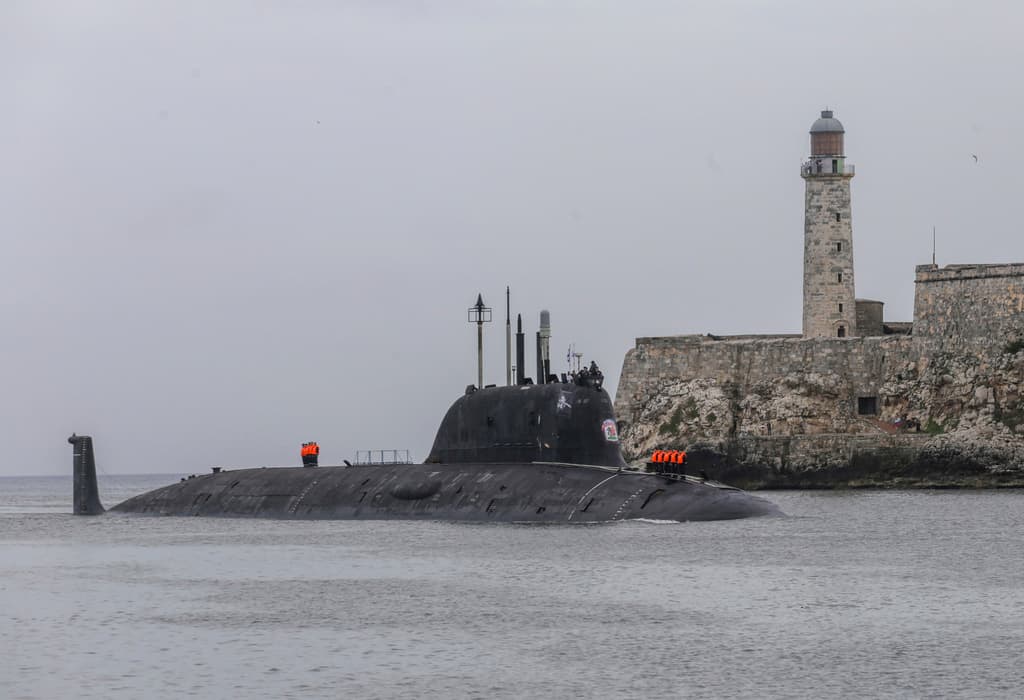Russians Visit Cuba, as Russ Warships Scout Our Coast — and Biden Is Out to Lunch
It’s a reminder that JFK went to the mat over Soviet missiles 90 miles off Key West.

Many Americans were shocked when they heard Russian warships were spotted off the coast of Miami on their way to Cuba.
For many, it brought back memories of the Cuban Missile Crisis in 1962. At that time, the Soviet Union attempted to offset the presence of American nuclear armed ballistic missiles in Turkey by placing similar nuclear armed ballistic missiles in Cuba.
President Kennedy regarded Soviet nuclear missiles 90 miles from Key West as a direct threat to America. The missiles would have short flight times. The Canadian and American air defense systems were focused on the north to detect potential Soviet bombers or missiles coming across the North Pole. Trying to contain a southern threat would have been an incredibly expensive and complicated undertaking.
Kennedy decided to make the Soviet gamble a major crisis — going so far as to threaten nuclear war if they did not back down. In a tense 13-day confrontation, nuclear war seemed frighteningly possible.
I was a student at Emory University at the time. I remember going into the library to work one afternoon and wondering if I would survive the night or ever see daylight again. The crisis was that real.
Apparently, the tension and pressure were getting to Premier Khrushchev more than Kennedy. Khrushchev sent two hand delivered letters. The first was conciliatory, and the second threatened to push America and the Soviets to the brink of war.
The president’s brother, the attorney general, Robert Kennedy, suggested the “Trollope ploy.” It was a reference to a 19th century novel series by Anthony Trollope. In the story, a young lady at a formal dinner drops her handkerchief. When an eligible — and wealthy — young man next to her picks up her napkin, she grabs his hand and says, “yes, I accept your proposal of marriage.” Not wishing to embarrass the young lady, the gentleman goes along and agrees to the marriage.
In that tradition, Robert Kennedy suggested to his brother and the working group that the president ignore Khrushchev’s second letter and simply answer the more conciliatory and positive first letter. The gambit worked. An agreement was reached in which the Soviets would publicly pull their weapons out of Cuba. A few months later, America quietly withdrew its more obsolete missiles from Turkey. Nuclear war was averted.
What reasonable person can imagine President Biden having the energy or cognitive ability to lead a strategic group for 13 days in a tense confrontation with President Putin — or Xi Jinping, Ali Khamenei, or Kim Jong-un, for that matter? The true dangers of Mr. Biden’s apparent cognitive decline come to the forefront when you contemplate how he would function as commander in chief in a real crisis.
Fortunately, the Russian naval warships recently left Havana and do not represent an existential threat to America. They do not require the kind of sustained edge-of-your-seat crisis that we had in 1962.
As a former National Security Adviser, John Bolton, noted, “for Putin, now is the time to flaunt Russia’s sophisticated weaponry and its geopolitical reach, 90 miles from the Florida Keys.
He added that “the Kremlin’s show of muscle was to remind Westerners, particularly in Washington (and even Beijing’s leaders, still short on blue-water naval assets) of Moscow’s global reach.”
That global reach was represented by the nuclear submarine Kazan — which is apparently falling apart — and the frigate Admiral Gorshkov. They were the heart of a small flotilla Mr. Putin sent into the Caribbean. Both ships have the capability to carry nuclear missiles, though Moscow said none were on them at this time. The Gorshkov is the first in a new series of frigates which have been described as world class and may be the heaviest armed frigates ever built.
Mr. Putin likely sent these ships to Cuba during the G-7 meeting to remind the leaders of the democracies that Russia remains a world power. He wanted them to know it has the wealth and strength to continue the war in Ukraine — and that Moscow should be dealt with carefully because it has the power to strike anywhere in the world.
The Russian ships at Havana will be a useful reminder that the world remains dangerous, America remains vulnerable, and that Mr. Biden is no Jack Kennedy.

